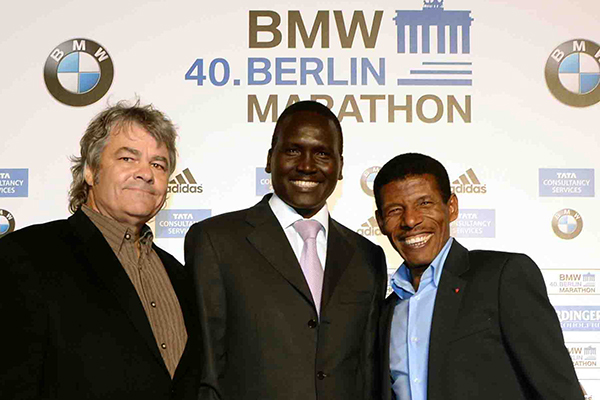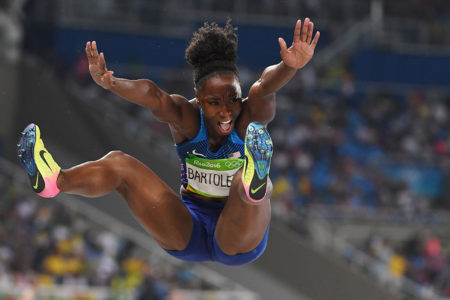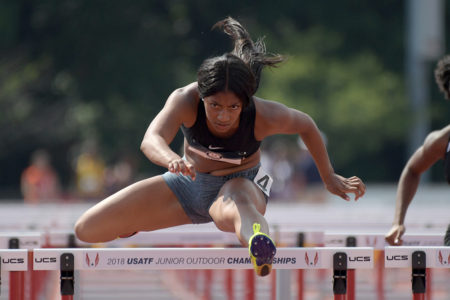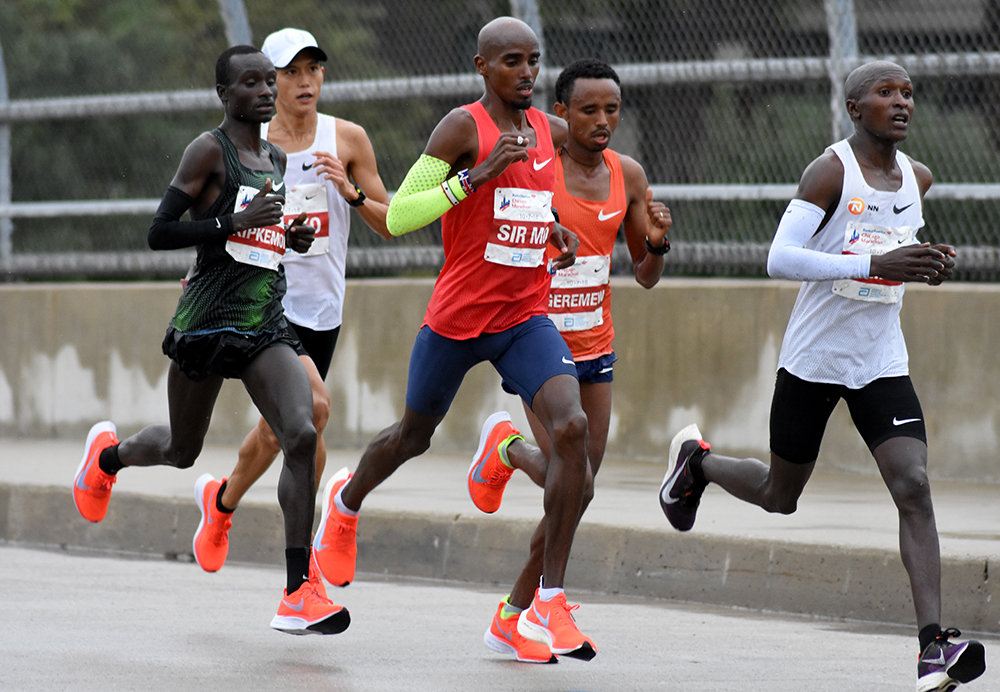
Chicago, Illinois, October 07—Mo Farah’s rapid rise up the ranks of world-class marathoners hit overdrive at the Bank of America Chicago Marathon as he powered away from an accomplished quartet of champions over the final 2M to notch his first win and a significant PR of 2:05:11. “It was a good day,” Sir Mo beamed: “I got the British Record, the European Record, so I was definitely more than happy. Now it is time to go home to my family and chill.”
The Windy City produced a couple of stellar races as Brigid Kosgei closed in a hurry to join the sub-2:19 club with a runaway win in 2:18:35. While the men’s race wasn’t as speedy, it was rich in competition as race director Carey Pinkowski brought back pacers and reigned in a bevy of talent from Farah and former training partner and defending champ Galen Rupp, to past champions Abel Kirui and Dickson Chumba, reigning world champ Geoffrey Kirui, Dubai winner Mosinet Geremew and Rotterdam winner Kenneth Kipkemoi—and many more.
The only thing to dampen the competition was a prerace downpour and a lingering foggy mist that left runners coping with wet pavement and backspray from competitors’ shoes. As it was, the hoped-for 62:00 opening half fell victim to a wind off the lake that made for a few slow stretches and a 63:06 split. And a bit of a struggle for Farah, who noted, “Early on I felt a bit sluggish; not tired, but just kind of couldn’t quite get moving.”
Reflecting on his lingering near the back of the pack between 20 and 30K, he added, “To be honest the pace was going up and down, so I knew from that someone was going to have to go hard-hard or the guys were not going to get a gap. So I was just trying to run my own race at that point, but I was just kind of not with it, and then towards the end I had to tell myself to get with it and get involved.”
A hard surge by Geoffrey Kirui at the 30K fluid station stoked the competition and drew Mo into the race. Kirui closed out a 14:27 segment with a 2:49 K and crossed the mat in 1:29:43—2:06:11 pace, then strung out the 9-man lead pack with a string of sub-2:53 kilos.
The pack was pared to 6 by 35K (1:44:16 – 2:05:48 pace) as Kipkemboi joined Kirui at the front, while Mo, Geremew, and Suguru Osaka covered the move. As did Rupp, but as he turned into Chinatown he started to slip off the pace—just as Kirui chose not to pit for fluids and threw down another surge to challenge the drinkers.
“Certainly I was hanging on at that point,” Rupp admitted, adding, “you always think, ‘Maybe I could gain a little bit skipping a drink,’ but for me I think it was the correct call to get the fluids in especially late in the race because you don’t want to totally crash. I thought I might be able to work my way back but I think it shows that I was teetering at that point.”
Farah also had some misadventure at the fluid station, tweaking an ankle. “I picked up my bottle and as I went across I put my foot in a ditch,” he explained. “It wasn’t too bad but quite painful for a mile or so.” Mo ran down Kirui and the 5-man lead pack regrouped and ran in tight formation as they rounded a turn and headed north back into the wind for the final 4K.
It was at this point that Mo took control of the race. Rather than leaving it late as he had often done in his mega gold medal track career, Farah displayed his marathon mentality as he powered through the wind in a long drive for home. “I was feeling strong at that point,” he said, “and I just wanted to go hard and just get rid of them as quick as I can without causing too much pain to myself and dying towards the end.”
He quickly pared down the contenders as first Kirui, then Osako and Kipkemboi were left behind, with only Geremew able to match the Briton’s push. The slight 25-year-old Ethiopian, whose 2:04:00 PR coming in topped the field, was an unknown to Farah. “I just wasn’t sure who he was and what kind of time he had run,” Farah said. “I don’t even know what kind of track background, so I just made sure that I had something at the end. I definitely had another couple of gears.”
After running side-by-side for 3km, Farah had at least one gear that Geremew couldn’t match and he broke clear and strode home to his first marathon win and a PR for him, and all of Europe. “Now I think I am a marathon runner, I know I am capable of mixing with the guys and can run a decent time,” said Farah. “It does help to have the confidence from the track of controlling the race. I think it is the same in the marathon, when you get comfortable at the marathon it becomes easier and you can control it. I definitely felt comfortable today, and over the last 3M I was in control.”
Geremew lost 13 seconds on the run-in, explaining, “I had some problems with my thigh in the last 3 weeks of training and in the last mile it made it hard to produce my normal finishing kick.”
Osako moved past Kipkemboi to finish 3rd in a Japanese Record 2:05:50 and may have been the day’s big winner as he became the first from his country to break 2:06 and in the process won ¥100M (c$885,000) for setting a new NR. Osako left the Japanese Corporate League to train with the Oregon Project in ’15 after running a national record 13:08.40 on the track. He has good intentions for sharing his huge prize: “I was thinking about this and maybe I will give $100,000 to my coach Pete Julian.”
After flirting with American Record pace, Rupp finished 5th in 2:06:21, a bit discouraged after producing the No. 5 U.S. performance ever, but clear-eyed about the strength of this competition. “Obviously my goal is to win, but I ran the best that I could today,” he said. “When I go back and look at it I’m sure that there will be some things that I can learn from this. That is all you can really ask for if you can learn from it and get better that is the most important thing. I just have to give credit to Mo and all the other guys who beat me they were just better than me today. I am happy for Mo, and for Suguru to get the Japanese Record; I know that is something that he has worked hard for.”
The 35 year-old Farah has also worked hard to advance his career as a marathoner training in Flagstaff under the direction of Gary Lough. “If you want to be the best at what you do you have to put in the work,” he said. “There is no secret what I do I’ve been doing it the last 10 years going away for training camp and for the last 2 months I’ve been away from the kids and everyone.”
With a big win in just his third 26-miler, Mo looks to what he learned last spring in London and a return to that race next April: “In the London Marathon I learned a lot, it taught me a lot about myself: I’m capable of running a decent time, I’m capable of mixing with the guys, and it taught me to just go out evenly and save as much energy as possible. In London it was good for me to go with Eliud and learn the hard way and appreciate these races.” As to where he thinks he might be able to take his PR, he posited, “I think I can definitely go low-2:04, high-2:03 if you have a decent race and it is smooth.”
CHICAGO MARATHON MEN’S RESULTS
World Marathon Major; Chicago, Illinois, October 07 (loop)—
1. Mo Farah (GB) 2:05:11 NR (45, x W) (14:52, 14:29 [30:11], 14:55 [45:06], 14:47 [59:53], 15:27 [1:15:20], 14:26 [1:29:46], 14:31 [1:44:17], 14:29 [1:58:46], 6:25) (30:11, 29:42 [59:53], 29:53 [1:29:46], 29:00 [1:58:46], 6:25) (63:06/62:05); 2. Mosinet Geremew (Eth) 2:05:24 (63:04/62:20); 3. Suguru Osako (Jpn) 2:05:50 NR (63:04/62:46); 4. Kenneth Kipkemoi (Ken) 2:05:57 (63:04/62:53);
5. Galen Rupp (US) 2:06:21 (x, 5 A) (63:04/63:17);
6. Geoffrey Kirui (Ken) 2:06:45 (63:03/63:42); 7. Abel Kirui (Ken) 2:07:52 (63:04/64:48); 8. Taku Fujimoto (Jpn) 2:07:57; 9. Bedan Muchiri (Ken) 2:07:59; 10. Birhanu Legese (Eth) 2:08:41; 11. Mohamed Reda El Aaraby (Mor) 2:09:16; 12. Yohei Suzuki (Jpn) 2:12:18; 13. Elkanah Kibet (US) 2:12:35; 14. Aaron Braun (US) 2:13:16; 15. Jonas Hampton (US) 2:14:19; 16. Parker Stinson (US) 2:14:29; 17. Ahmed Osman (US) 2:14:40; 18. Bernard Kipyego (Ken) 2:16:12; 19. Yuki Kawauchi (Jpn) 2:16:26; 20. Tyler McCandless (US) 2:16:37.
Kosgei Joins Women’s All-Time Top 10
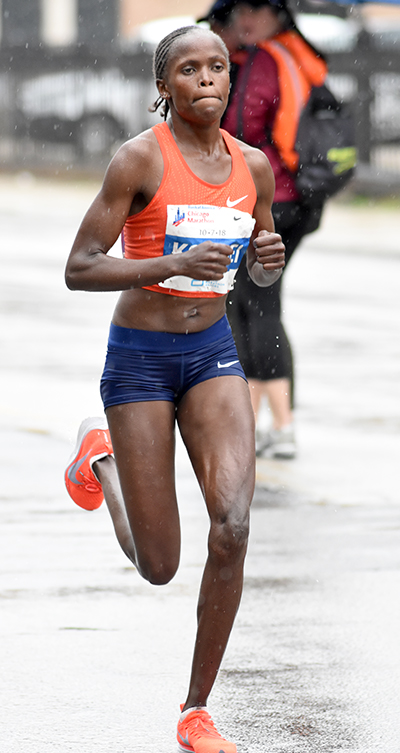
The women’s race lacked a similar competitive luster simply due to the way that Brigid Kosgei scorched the final 12K. After passing halfway in 70:09 she ran with Ethiopian duo of Roza Dereje and Shure Demise and 2-time Chicago champ Florence Kiplagat as they crossed 30K in 1:40:01—2:20:42 pace. Then the 24-year-old Kosgei went on a tear, running 15:36 of the subsequent 5K, followed by 15:47 through 40K as she stormed home to become the No. 7 performer, and moving up from her runner-up finish here last year.
Kosgei’s break was motivated by time. “After 30km I moved alone because I was looking for a good time and I wanted to improve my personal best,” she said. “When I reached 35km I saw the other competitors were not following me; I was just pushing myself and I finished like that.”
Dereje finished 2nd in 2:21:18, and Demise 3rd in 2:22:15.
The U.S. placed 4 in the top with, with Sarah Crouch 6th, Taylor Ward 7th, Kate Landau 8th and Marci Klimek 10th. Former triathlon star Gwen Jorgensen’s much anticipated race turned out to be a 2:36:23 “learning experience” in 11th.
CHICAGO WOMEN’S RESULTS
1. Brigid Kosgei (Ken) 2:18:35 PR (7, 10 W);
2. Roza Dereje (Eth) 2:21:18; 3. Shure Demise (Eth) 2:22:15; 4. Florence Kiplagat (Ken) 2:26:08; 5. Veronicah Nyaruai (Ken) 2:31:34; 6. Sarah Crouch (US) 2:32:37 PR; 7. Taylor Ward (US) 2:32:42 PR; 8. Kate Landau (US) 2:33:24 PR; 9. Melanie Myrand (Can) 2:34:08; 10. Marci Klimek (US) 2:34:53; 11. Gwen Jorgensen (US) 2:36:23;… 14. Katie Matthews (US) 2:38:16;… 27. Chirine Njeim (Leb) 2:43:04; 28. Alexi Pappas (Gre) 2:43:38; 29. Jess Draskau-Petersson (Den) 2:44:11;… 281. Joan Samuelson (US) 3:12:13.
